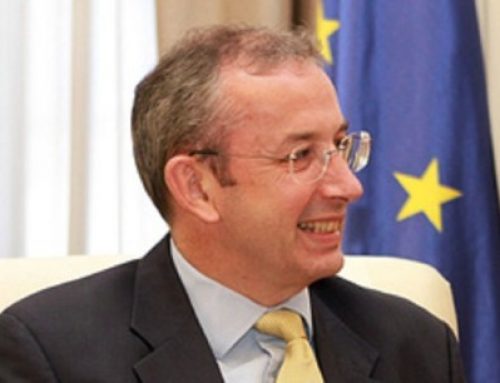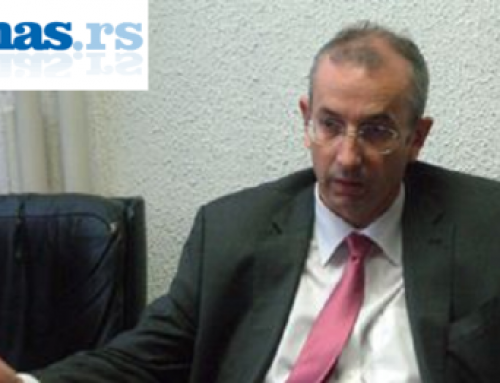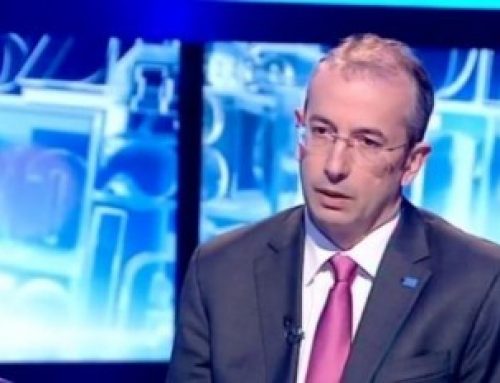In an interview with FoNet news agency, Head of the EU Delegation to Serbia Michael Davenport said that it was “realistic to expect” the opening of first negotiating chapters with Serbia “in the coming months” in early 2015.
In line with EU’s new approach, at the very beginning, focus of attention is on rule of law, judicial independence, fight against the corruption, fundamental and minority rights, security issues, Davenport said.
This is why we have been seriously and actively working with ministries of Justice and Interior on action plans in order to enable Serbia to open chapters 23 and 24 as soon as possible, he said.
According to Davenport “it is realistic to expect the opening in the coming months” in early 2015.
In addition, European Commission suggested Member States that the Chapter 32 should be open with Serbia, Davenport said, adding that it was now up to them to make a decision.
The European Union have made a clear sign of commitment to enlarge during the past years, Davenport said, adding that an entire series of European Council’s decisions had been made in this regard, but also listing a recent visit of European Commissioner Johannes Hahn to Serbia as a sign.
This visit was his first to an EU candidate country, which was a very positive and encouraging message for Serbian citizens, conveying the EU’s commitment to politically and financially support the efforts made by Serbia, Davenport said.
When asked “Until when Serbia could delay its decision regarding restrictive measures against Russia?,” Davenport replied that Serbia held the right to its own foreign policy, but that it still needed to progressively adjust its foreign policy with the one of the EU, just as Commissioner Hahn clearly put it during his visit to Belgrade ten days ago.
It is clear that Serbia support EU’s position regarding the territorial integrity of Ukraine, as well as its position regarding the restrictive measures is clear, but as a membership candidate, already engaged in accession negotiations, Serbia have to progressively align its foreign policy to the one of the EU in the coming years, Davenport explains.
Asked if Serbia was a collateral damage in the EU-Russia dispute and to whom it might turn for compensation of damage, due to cancellation of Southern Stream project, Davenport replied that “the EU’s position is completely clear.”
The European Union are ready to support every single endeavour of this kind, provided that is in line with EU standards and expectations within the European legislation and rules,” Davenport said.
Asked “what is the EU’s position regarding the coming of yet another major player, China, to the Balkans, given that Chinese Prime Minister will be chairing a summit with Central and East European leaders,” Davenport said “this is no news” because a similar meeting has already been organised in Bucharest.
“I believe it reflects the fact that every country in Europe wants to cooperate with China. It is a major power, with a huge economy and the EU surely want to improve its trade and political relations with China,” Davenport stressed.
He therefore considers it is normal that China organises another similar meeting in Belgrade, in an EU candidate country.
Reflecting on more than half Serbian citizens who are in favour of joining EU, in spite of all internal and external turmoil of the country, Davenport said this was “highly positive”.
We are witnessing a rather stable trend of support toward Serbia’s EU membership, and a majority of citizens having an ever-positive approach to the Union, Davenport said, adding that the EU was Serbia’s biggest partner in fighting against the flood consequences after the disastrous May floods.
This is another example of EU’s solidarity, Davenport said, adding that the EU remained biggest Serbian partner in every area.
I must highlight the fact that the EU is main Serbian trade partner, he said and explained that over 63 per cent of Serbia’s trade is realised with EU Member States.
Besides, foreign direct investment from EU amounts to 11 billion euros, which also happens to be 63 per cent of total FDI in Serbia, Davenport said, adding he believed that Serbia’s major potential for growth and investments lies in the relations with the EU.

On the other hand, Davenport believes that the highest number of citizens understands that the EU have nothing to do with event such as the Serbia-Albanian football match, or the visit of Albanian Prime Minister Edi Rama, as well as developments regarding Vojislav Seselj.
According to him, “neither the EU bore any relation to that football match, nor were in anyway responsible for the incidents.”
“I condemned the events that occurred at the stadium in Belgrade, but I also commended the engagement of Serbian enforcement authorities,” Davenport said and noted that it was not up to EU to address these issues, but the UEFA.
As far as Albanian Prime Minister’s visit is concerned, Davenport said that, despite all the problems, it still was a progress and two countries signed several new agreements.
Also, important political contacts were established, Davenport stressed, and expressed hope that those facts would mark a new stage in bilateral relations.
He welcomed the announcements made by several ministers of Serbian Government who clearly stated that politics of Vojislav Seselj was a relict of the past and said that, for Serbia, it was much more important to focus on things that must be done in order to provide prosperity to citizens – not to stray on the path of serious and deep reforms.

When asked to comment on the state of media in Serbia, Davenport said the adoption of new media laws was an important positive change, as indicated in European Commission’s Annual Progress Report.
“Serbia have entered a new stage of the implementation of the said laws, which will, of course, be crucial,” Davenport said.
According to him, the implementation of these laws, especially in the areas of media ownership transparency, programme financing and privatisation, needs monitoring.
These are highly complex processes and it is absolutely crucial that all stakeholders play their part in them: regulatory bodies, media associations and civil society, as well as Serbian Government, Davenport said.
Asked whether he personally believed that the State would withdraw its influence from the media or would any mayor or president of a municipality agree to allocate the money out of the budget and direct it to media that criticise their work, Davenport replied: “Let’s say this is going to be the greatest challenge within the area.”
“At first, the ride is going to be a little bumpy, but I am convinced that the laws will be fully implemented,” Davenport said and noted that the implementation concerned everyone, including Serbian Government and regulatory bodies.
He said that in the coming months, the EU and OSCE would actively monitor all of these events and added that media laws “have to be implemented.”



